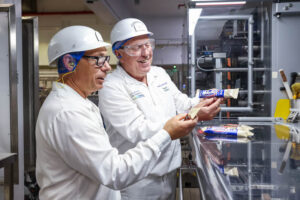Mars Wrigley Australia plans paper-based packaging for chocolate ranges

pic: Mars
A major environmental move has been delivered by Mars Wrigley Australia, as it commits to moving all its nationally-made chocolate ranges to paper-based packaging, reports Neill Barston.
As the company explained to Confectionery Production, the move enables wrapper waste to be processed through traditional kerbside recycling, with the business explaining that the region was setting a world-first for the business as part of its goal of achieving national packaging targets by 2025.
It will apply to its core Mars bars, Snickers and Milky Way from April 2023, which is anticipated to eliminate more than 360 tonnes of plastic from its value chain, enough to stretch from Melbourne to London and back.
The new sustainably sourced paper-based packaging is a result of extensive R&D trials and locally driven innovation from Mars Wrigley’s manufacturing site in Ballarat. The packaging is widely recyclable through recycling bins, enabling consumers to easily recycle the packaging via their kerbside recycling bin.
As recently reported, the company has undertaken a number of environmental initiatives in recent times, including a fresh collaboration with Olyns in the US, a recycling technology business, in a new venture that makes collecting plastic sweets and gum containers into a gaming experience.
In terms of its latest Australian venture, the Ballarat-based R&D team leading this project is pioneering paper-based sustainable packaging solutions for the Mars Wrigley business globally. With the plan for the technology, learnings and insights developed and deployed locally in Australia to be shared and implemented in other Mars Wrigley markets across the globe.

Andrew Leakey, general manager, of Mars Wrigley Australia, (pictured main image), said: “The transition to paper-based packaging for our locally made chocolate bars marks a significant milestone in our sustainability journey.
“Mars’s ongoing investment in local R&D has allowed us to be agile and create solutions that have a positive impact on our environment, meet our stringent quality and food safety standards, but are also convenient for our customers to recycle via kerbside recycling. This was crucially important for us as we wanted to ensure customers had easy access to recycle our new paper-based packaging,” adding that the business had a responsibility to lower its environmental footprint across the business, including its packaging.
CEO of APCO, Chris Foley, added that the move was a prime example of innovation within the food industry to meet its goals on the impact of packaging.
Furthermore, the CEO of FSC Australia and New Zealand, Melanie Robertson, added that in her view the development “sent an essential message on using forest-friendly alternatives to single-use plastics.”
